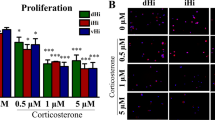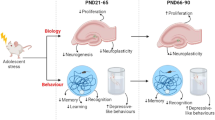Abstract
Glucocorticoids are released in response to stressful experiences and serve many beneficial homeostatic functions. However, dysregulation of glucocorticoids is associated with cognitive impairments and depressive illness1,2. In the hippocampus, a brain region densely populated with receptors for stress hormones, stress and glucocorticoids strongly inhibit adult neurogenesis3. Decreased neurogenesis has been implicated in the pathogenesis of anxiety and depression, but direct evidence for this role is lacking4,5. Here we show that adult-born hippocampal neurons are required for normal expression of the endocrine and behavioural components of the stress response. Using either transgenic or radiation methods to inhibit adult neurogenesis specifically, we find that glucocorticoid levels are slower to recover after moderate stress and are less suppressed by dexamethasone in neurogenesis-deficient mice than intact mice, consistent with a role for the hippocampus in regulation of the hypothalamic–pituitary–adrenal (HPA) axis6,7. Relative to controls, neurogenesis-deficient mice also showed increased food avoidance in a novel environment after acute stress, increased behavioural despair in the forced swim test, and decreased sucrose preference, a measure of anhedonia. These findings identify a small subset of neurons within the dentate gyrus that are critical for hippocampal negative control of the HPA axis and support a direct role for adult neurogenesis in depressive illness.
This is a preview of subscription content, access via your institution
Access options
Subscribe to this journal
Receive 51 print issues and online access
$199.00 per year
only $3.90 per issue
Buy this article
- Purchase on Springer Link
- Instant access to full article PDF
Prices may be subject to local taxes which are calculated during checkout




Similar content being viewed by others
References
Holsboer, F. & Ising, M. Stress hormone regulation: biological role and translation into therapy. Annu Rev. Psychol. 61, 81–109 (2010)
McEwen, B. S. Physiology and neurobiology of stress and adaptation: central role of the brain. Physiol. Rev. 87, 873–904 (2007)
Mirescu, C. & Gould, E. Stress and adult neurogenesis. Hippocampus 16, 233–238 (2006)
Sapolsky, R. M. Is impaired neurogenesis relevant to the affective symptoms of depression? Biol. Psychiatry 56, 137–139 (2004)
Drew, M. R. & Hen, R. Adult hippocampal neurogenesis as target for the treatment of depression. CNS Neurol. Disord. Drug Targets 6, 205–218 (2007)
Roozendaal, B. et al. Memory retrieval impairment induced by hippocampal CA3 lesions is blocked by adrenocortical suppression. Nature Neurosci. 4, 1169–1171 (2001)
Jankord, R. & Herman, J. P. Limbic regulation of hypothalamo-pituitary-adrenocortical function during acute and chronic stress. Ann. NY Acad. Sci. 1148, 64–73 (2008)
Garcia, A. D., Doan, N. B., Imura, T., Bush, T. G. & Sofroniew, M. V. GFAP-expressing progenitors are the principal source of constitutive neurogenesis in adult mouse forebrain. Nature Neurosci. 7, 1233–1241 (2004)
Seri, B., Garcia-Verdugo, J. M., McEwen, B. S. & Alvarez-Buylla, A. Astrocytes give rise to new neurons in the adult mammalian hippocampus. J. Neurosci. 21, 7153–7160 (2001)
Borrelli, E., Heyman, R. A., Arias, C., Sawchenko, P. E. & Evans, R. M. Transgenic mice with inducible dwarfism. Nature 339, 538–541 (1989)
Burns, K. A., Murphy, B., Danzer, S. C. & Kuan, C.-Y. Developmental and post-injury cortical gliogenesis: a genetic fate-mapping study with Nestin-CreER mice. Glia 57, 1115–1129 (2009)
Santarelli, L. et al. Requirement of hippocampal neurogenesis for the behavioral effects of antidepressants. Science 301, 805–809 (2003)
Furay, A. R., Bruestle, A. E. & Herman, J. P. The role of the forebrain glucocorticoid receptor in acute and chronic stress. Endocrinology 149, 5482–5490 (2008)
Wojtowicz, J. M. Irradiation as an experimental tool in studies of adult neurogenesis. Hippocampus 16, 261–266 (2006)
Doetsch, F., Caille, I., Lim, D. A., Garcia-Verdugo, J. M. & Alvarez-Buylla, A. Subventricular zone astrocytes are neural stem cells in the adult mammalian brain. Cell 97, 703–716 (1999)
Airan, R. D. et al. High-speed imaging reveals neurophysiological links to behavior in an animal model of depression. Science 317, 819–823 (2007)
Surget, A. et al. Antidepressants recruit new neurons to improve stress response regulation. Mol. Psychiatry 10.1038/mp.2011.48 (2011)
David, D. J. et al. Neurogenesis-dependent and -independent effects of fluoxetine in an animal model of anxiety/depression. Neuron 62, 479–493 (2009)
Anacker, C., Zunszain, P. A., Carvalho, L. A. & Pariante, C. M. The glucocorticoid receptor: pivot of depression and of antidepressant treatment? Psychoneuroendocrinology 36, 415–425 (2011)
Ridder, S. et al. Mice with genetically altered glucocorticoid receptor expression show altered sensitivity for stress-induced depressive reactions. J. Neurosci. 25, 6243–6250 (2005)
Castagné, V., Moser, P. & Porsolt, R. D. in Methods of Behavior Analysis in Neuroscience 2nd edn (ed. Buccafusco, J. J. ) Ch. 6 (CRC Press, 2009)
Revest, J.-M. et al. Adult hippocampal neurogenesis is involved in anxiety-related behaviors. Mol. Psychiatry 14, 959–967 (2009)
Treadway, M. T. & Zald, D. H. Reconsidering anhedonia in depression: lessons from translational neuroscience. Neurosci. Biobehav. Rev. 35, 537–555 (2011)
Barkus, C. et al. Hippocampal NMDA receptors and anxiety: at the interface between cognition and emotion. Eur. J. Pharmacol. 626, 49–56 (2010)
Duman, C. H. Models of depression. Vitam. Horm. 82, 1–21 (2010)
Sandi, C. & Pinelo-Nava, M. T. Stress and memory: behavioral effects and neurobiological mechanisms. Neural Plast. 2007, 78970 (2007)
Oomen, C. A. et al. Severe early life stress hampers spatial learning and neurogenesis, but improves hippocampal synaptic plasticity and emotional learning under high-stress conditions in adulthood. J. Neurosci. 30, 6635–6645 (2010)
Delaney, C. L., Brenner, M. & Messing, A. Conditional ablation of cerebellar astrocytes in postnatal transgenic mice. J. Neurosci. 16, 6908–6918 (1996)
Snyder, J. et al. Adult-born hippocampal neurons are more numerous, faster maturing, and more involved in behavior in rats than in mice. J. Neurosci. 29, 14484–14495 (2009)
Brown, T. S. & Murphy, H. M. Factors affecting sucrose preference behavior in rats with hippocampal lesions. Physiol. Behav. 11, 833–844 (1973)
Acknowledgements
We thank A. Sowers and J. Mitchell for help with irradiation, M. Brenner for providing the plasmid construct, GlaxoSmithKline for providing the antibody against HSV-TK, and K. Sanzone, F. Kamhi, L. Glover, S. Ferrante and L. Grigereit for assisting with mouse breeding and treatment. This research was supported by the Intramural Program of the National Institute of Mental Health, National Institutes of Health, USA, ZIA MH002784 (to H.A.C.).
Author information
Authors and Affiliations
Contributions
J.S.S. performed histological, endocrine and behavioural experiments, analysed data and wrote the paper; A.S. performed behavioural experiments and analysed behavioural data; H.A.C. performed endocrine experiments, analysed data and wrote the paper; J.P. and M.B. generated the transgenic mice.
Corresponding author
Ethics declarations
Competing interests
The authors declare no competing financial interests.
Supplementary information
Supplementary Figures
This file contains Supplementary Figures 1-9 with legends. (PDF 875 kb)
Rights and permissions
About this article
Cite this article
Snyder, J., Soumier, A., Brewer, M. et al. Adult hippocampal neurogenesis buffers stress responses and depressive behaviour. Nature 476, 458–461 (2011). https://doi.org/10.1038/nature10287
Received:
Accepted:
Published:
Issue Date:
DOI: https://doi.org/10.1038/nature10287
This article is cited by
-
Stress increases hepatic release of lipocalin 2 which contributes to anxiety-like behavior in mice
Nature Communications (2024)
-
Glial-restricted precursors stimulate endogenous cytogenesis and effectively recover emotional deficits in a model of cytogenesis ablation
Molecular Psychiatry (2024)
-
Pathogenesis of Depression in Alzheimer’s Disease
Neurochemical Research (2024)
-
Treadmill exercise modulates the medial prefrontal-amygdala neural circuit to improve the resilience against chronic restraint stress
Communications Biology (2023)
-
Gut microbiota changes require vagus nerve integrity to promote depressive-like behaviors in mice
Molecular Psychiatry (2023)
Comments
By submitting a comment you agree to abide by our Terms and Community Guidelines. If you find something abusive or that does not comply with our terms or guidelines please flag it as inappropriate.



